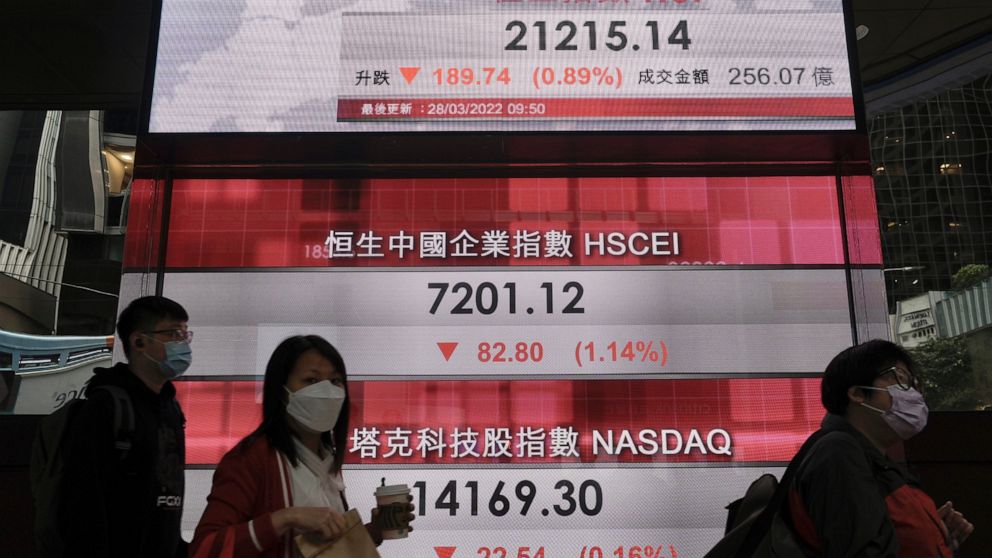Asian shares mixed as markets eye Ukraine, inflation worries
Asian shares are mixed as worries about the pandemic, inflation and the war in Ukraine weigh on market sentiment
TOKYO — Asian shares were mixed on Monday as worries about the pandemic, inflation and the war in Ukraine weighed on market sentiment.
Benchmarks in Hong Kong and Sydney gained while Tokyo, Seoul and Shanghai declined.
Adding to concern over the economic impact from the pandemic, Shanghai went into a nine-day semi-lockdown. With China’s economic growth already slowing, the extreme measure could worsen unemployment, sap consumer demand and further complicate already snarled global supply chains.
The Shanghai Composite index edged 0.2% lower to 3,207.10.
More broadly, the war in Ukraine and inflation are clouding the global outlook. The Federal Reserve’s moves to raise interest rates to counter surging prices are another worry in uncertain times.
“Heading into the new week, geopolitical tensions and the outlook for Fed’s tightening path may add some volatility in the markets. Over the many rounds of talks, it has shown that a peaceful resolution between Ukraine and Russia may be harder than expected,” said Yeap Jun Rong, market strategist at IG in Singapore.
Japan’s benchmark Nikkei 225 slipped nearly 0.7% to 27,966.51 in afternoon trading, while Australia’s S&P/ASX 200 gained 0.1% to 7,412.40.
South Korea’s Kospi inched down less than 0.1% to 2,728.95. Hong Kong’s Hang Seng surged 0.7% to 21,546.16.
The U.S. Federal Reserve has indicated it may continue to raise interest rates as a way to curb inflation. Earlier this month, Fed officials raised their key rate a quarter-point from near zero to a range of 0.25% to 0.5%.
The war is adding to worries over instability, energy prices and economic slowdowns in various nations. Over the weekend, Ukrainian President Volodymyr Zelenskyy accused the West of cowardice, pleading for fighter jets and tanks to help defend his country from Russia’s invading troops.
Russia has said its main focus in the conflict is on taking control of the eastern Donbas region, an apparent pullback from its earlier, more expansive goals, but one which is raising fears of a divided Ukraine. Earlier, President Joe Biden said in a speech that Russian President Vladimir Putin could not stay in power. White House aides have rushed to play down the comments, clarifying that Biden wasn’t calling for “regime change.”
“The new shutdown measures due to COVID are expected to be short-term road bumps on a long up-trending road, as the impact of the lockdowns on medium-term oil demand will certainly remain limited,” said Ipek Ozkardeskaya, senior analyst at Swissquote.
“The war and the worries of falling capacity from OPEC are more disturbing than a Shanghai lockdown.”
Wall Street ended last week with a moderate rally. The S&P 500 rose 1.8% to 4,543.06 for a 0.5% gain for the week. The Dow gained 0.4% to 34,861.24. The Nasdaq fell 0.2% to 14,169.30.
The Russell 2000 index added 0.1% to 2,077.98.
Oil prices have been volatile since Russia’s war against Ukraine began in February. Russia is the second-biggest crude exporter. Energy prices were already high, but the conflict has raised concerns about a worsening supply crunch that could maker persistently rising inflation even worse.
Japan imports virtually all its oil, almost all of it from the Middle East. But surging prices will dent an already fragile economy reeling from off-and-on restrictions over the last two years to contain COVID-19 infections.
Benchmark U.S. crude fell $4.28 to $109.62 a barrel Monday in electronic trading on the New York Mercantile Exchange. It rose 1.4% to settle at $113.90 per barrel late Friday. Brent crude, the international pricing standard, fell $4.11 to $116.54 a barrel.
In currency trading, the U.S. dollar rose to 123.16 Japanese yen from 122.07 yen. The euro cost $1.0952, down from $1.0989.
———
Yuri Kageyama is on Twitter https://twitter.com/yurikageyama
![]()


